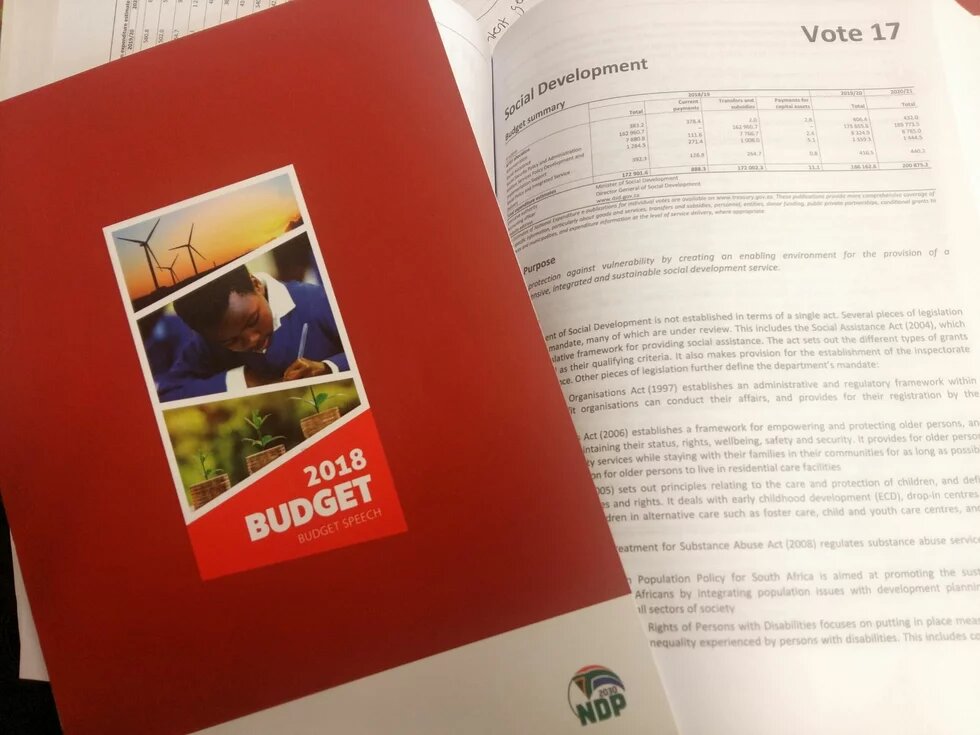Social protection is an important safety net for the poor yet not all will benefit from this. Finance Minister Malusi Gigaba this week delivered his budget speech in Parliament and announced the government’s plan to increase its spending on social protection from R193.4 billion in the next financial year to R223.9 billion by 2021.

Civil society organisations, however, questioned if this commitment to social protection will include sufficient funding for non-profit organisations, including shelters that provide services to vulnerable women and children who fall victim to domestic abuse.
The social development department, as part of its national social protection programme, undertakes to “contribute to reducing incidents of social crime and improving victim empowerment services”, to facilitate “integrated social crime prevention campaigns in provinces by March 2019” and to “submit a Victim Empowerment Support Services Bill to Cabinet for approval by March 2019”.
In the budget vote for social development, tabled as part of the estimates for national expenditure, the department also acknowledges the importance of maintaining a “healthy working relationship” between government and non-profit organisations.
But putting the money where its mouth is has proved to be a challenge.
Findings from a recent research study on state funding of shelters by the National Shelter Movement of South Africa and the Heinrich Boell Foundation (HBF) highlighted inadequate funding of shelters for abused women and children.
The findings show that shelters that are run by non-profit organisations sampled in Mpumalanga and KwaZulu-Natal often faced severe funding constraints.
The department of social development funds these shelters yet the operating costs often far exceed the department funding they receive.
Without adequate funding, services to vulnerable women and children – who often have no other alternative – remain limited.
These funding constraints limit the shelters’ ability to provide comprehensive services to vulnerable women and children and were often inconsistent and delayed, the study found.
In the shelters sampled, most of the women relied on the shelters for food, toiletries and other necessities because most of them were unemployed and in most cases, did not receive social grants.
However, Gigaba announced an additional allocation of R201 million towards the provincial equitable share for the prevention and mitigation of violence against women and children – something civil society organisations welcomed.
How provinces would use this money and the extent to which these shelters would benefit remains to be seen.
Senior researcher at the Tshwaranang Legal Advocacy Centre, Lisa Vetten, labelled this announcement as “exciting” since it meant there would not be any budget cuts to programmes aimed at protecting women and children.
“So, this R201 million is additional to what provinces already get for social development but the money is not ringfenced and that is a problem.
This means the departments can use the money for other purposes and civil society organisations will have to monitor this closely,” she warned.
HBF project manager Claudia Lopes said legislative clarity on the funding of shelters was important to ensure money was allocated and used for the intended purpose.
HBF’s research report, Housing Women Who Have Experienced Abuse: Policy, Funding and Practice, found that although domestic violence victims’ right to access shelters were provided for in legislation, there was no clarity on whose duty it was to provide and fund these shelters.
The proposed Victim Empowerment Support Services Bill that the government wanted to submit to Cabinet next year provides an opportunity to create much-needed legislative clarity on these funding issues.
According to Lopes the bill in its current form lacked “the content needed to address the plight faced by shelters” and needed to be reworked if there was to be any meaningful shift in the plight of these shelters.
On a broader national level, the budget vote for the national department of social development showed budget allocations for victim empowerment that did not inspire much hope.
A total of R65.2 million was allocated for victim empowerment in the coming financial year as part of the national welfare services policy development and implementation support sub programme.
This would increase to R74.3 million by 2021. Non-profit institutions – government’s foot soldiers delivering important social services in this sub programme – were set to receive R121.8 million to deliver services.
The national non-profit organisations specialising in social crime prevention were set to receive R6.4 million and those specialising in services to families would receive R1.6 million in the coming financial year.
Executive member of the National Shelter Movement, Zubeda Dangor, said: “The social development department continues to provide about 1% to 2% of its overall budget to the victim empowerment programme, the programme under which shelters are funded”.
From there, depending on the province, allocations to shelters for women might range from 25% to 49% of the entire victim empowerment programme budget. Organisations working on victim empowerment tended to be funded less than those providing services in other social welfare areas. This was despite the government stating that shelters were a “national priority”.
The picture did not look significantly different judged by the current budget and the increase in VAT that would also hit these shelters hard as costs rose.
Lopez said it was therefore critical that treasury also monitored the effect of the increased VAT on institutions like shelters that provided social welfare services for some of these very same poor households government wanted to protect.
---
This article originally appeared on ParlyBeat, a biweekly digital newsletter aimed at linking policy and oversight processes in Parliament to the lived realities of ordinary people. The original article can be accessed at http://dullahomarinstitute.org.za/women-and-democracy/parlybeat/funding…. It was also featured in the City Press and accessible via https://city-press.news24.com/News/funding-of-shelters-for-abused-women…